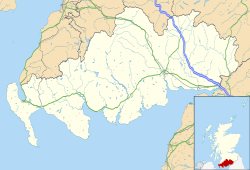Cairnholy
Coordinates: 54°51′33″N 4°18′34″W / 54.859239°N 4.309579°W
 Cairnholy I | |
 Shown within Dumfries and Galloway | |
| Location | Dumfries and Galloway |
|---|---|
| Coordinates | 54°51′33″N 4°18′34″W / 54.859239°N 4.309579°W |
| Type | Chambered tomb |
| History | |
| Periods | Neolithic |
| Site notes | |
| Ownership | Historic Scotland |
| Public access | Yes |
Cairnholy (or Cairn Holy) is the site of two Neolithic chambered tombs of the Clyde type.[1] It is located 4 kilometres east of the village of in Dumfries and Galloway, Scotland (grid reference NX518540). The tombs are scheduled monuments in the care of Historic Scotland.
The name Cairnholy represents Gaelic *Càrn na h-ulaidhe ‘cairn of the stone tomb’.[2]
Description[]
The Cairnholy tombs are situated on a hillside overlooking Wigtown Bay. They are situated next to Cairnholy Farm. The site can be accessed at the end of a minor road about 1 kilometre from the A75 road. The two tombs lie within 150 metres of each other.[3]
Both tombs lie open to the sky as most of their original covering stones have been taken in the past to build field walls.[3] Both tombs were partially excavated in 1949 by Stuart Piggott and .[3] Finds from the excavations are in the National Museum of Scotland.[4][5]
Cairnholy I[]

Cairnholy I (grid reference NX51765389) is the more elaborate of the two tombs. It measures 50 by 15 metres and has a monumental curving façade, that formed the backdrop to a forecourt in front of the tomb.[4] Excavation showed that several fires had been lit in the forecourt.[3]
The tomb itself has two chambers. The outer chamber, which was entered through the façade, contained a fragment of a jadeite ceremonial axe, together with sherds of Neolithic pottery and a leaf-shaped arrowhead.[4] Late grave-goods comprised Peterborough-ware and Beaker-ware pottery sherds and a flint knife.[4] The inner chamber was built as a closed box, and was inaccessible from the outer one.[3] It was probably originally roofed by a great stone slab resting on the two taller end-slabs.[3] The inner chamber contained a secondary cist, with food vessel sherds and a cup-and-ring carved stone.[4]
Cairnholy II[]

Cairnholy II (grid reference NX51825404) is located to the north of Cairnholy I. Local tradition maintains that it was the tomb of , a mythical Scottish king.[3] It is from this tomb that the nearby farm takes its name.[4] It measures 20 by 12 metres, and is less than 60 centimetres high.[5] It has been robbed of stones but there are still two portal stones in front of the chambered tomb.[3] There is a very shallow v-shaped forecourt at the front of the tomb.[5] The tomb contained two chambers.[5] The rear chamber had been previously robbed, and the other disturbed, but an arrowhead and a flint knife were found within the filling, along with secondary sherds of Beaker pottery.[5]
Other prehistoric monuments[]
Around 160 metres to the east of Cairnholy farm is the remains of circular cairn less than 15 centimetres high (grid reference NX51975413).[6] When stones were being removed from it some time before 1849, it was found to contain human bones.[6]
The area is surrounded with rocks bearing cup and ring marks.[7][8][9][10]
Kirkdale Church[]
Around 700 metres to the west are the ruins of Kirkdale Church. The church was dedicated to St Michael. Kirkdale, which belonged to Whithorn Priory, was originally a separate parish, which united with Kirkmabreck in 1618.[11] The church is enclosed by an overgrown burial ground.[11]
References[]
- ^ Cummings, Vicki (2003). "Monuments and Landscape: Encounters at Cairnholy" (PDF). Transactions of the Dumfriesshire and Galloway Natural History and Antiquarian Society. 77: 23-36 at 26.
- ^ James, Alan G. (16 October 2018). "Place-names in and around the Fleet Valley: C" (PDF). Gatehouse Folk. Retrieved 20 April 2019.
- ^ a b c d e f g h Cairn Holy Chambered Cairns, Historic Scotland, accessed 6 February 2014
- ^ a b c d e f Historic Environment Scotland. "Cairnholy I (63716)". Canmore. Retrieved 6 February 2014.
- ^ a b c d e Historic Environment Scotland. "Cairnholy II (63705)". Canmore. Retrieved 6 February 2014.
- ^ a b Historic Environment Scotland. "Cairnholy 6 (63757)". Canmore. Retrieved 6 February 2014.
- ^ Historic Environment Scotland. "Cairnholy 4 (63726)". Canmore. Retrieved 6 February 2014.
- ^ Historic Environment Scotland. "Cairnholy 5 (63728)". Canmore. Retrieved 6 February 2014.
- ^ Historic Environment Scotland. "Cairnholy 8 (77510)". Canmore. Retrieved 6 February 2014.
- ^ Historic Environment Scotland. "Cairnholy 9 (77506)". Canmore. Retrieved 6 February 2014.
- ^ a b Historic Environment Scotland. "Kirkdale Church And Burial-Ground (63727)". Canmore. Retrieved 6 February 2014.
External links[]
| Wikimedia Commons has media related to Cairn Holy Chambered Cairns. |
- Archaeological sites in Wigtownshire
- Historic Scotland properties in Dumfries and Galloway
- Megalithic monuments in Scotland
- Neolithic Scotland
- Scheduled Ancient Monuments in Dumfries and Galloway
- Chambered cairns in Scotland
